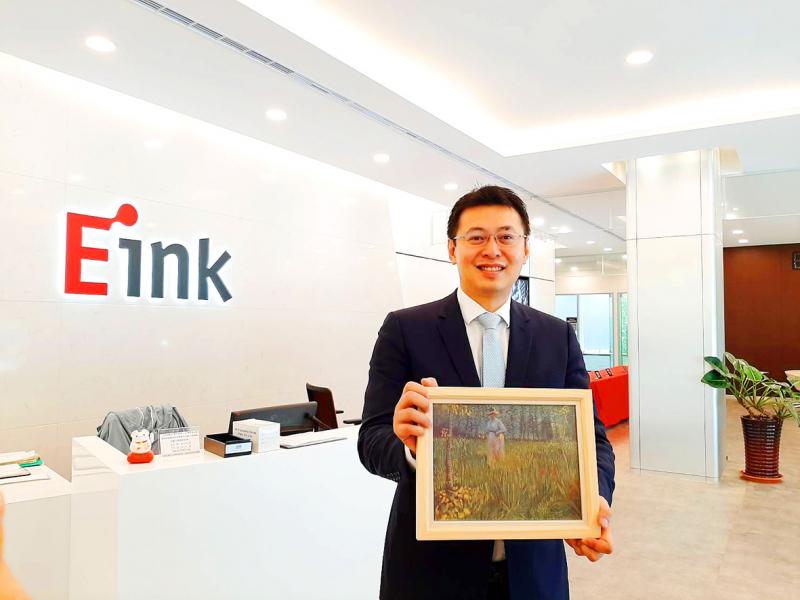E Ink Holdings Inc (元太科技), the world’s sole supplier of e-paper displays for e-readers and electronic shelf labels, yesterday gave a positive outlook for the second half of this year, as the COVID-19 pandemic is stimulating demand.
The Hsinchu-based company said that the pandemic is accelerating adoption of its labels as retailers seek to avoid virus transmission routes, as well as enhancing delivery efficiency.
The pandemic “is increasing demand, as we expected,” E Ink chairman Johnson Lee (李政昊) told an investors’ teleconference. “Because of the pandemic, there has been an increase in the number of retailers asking about how labels would help them improve delivery efficiency.”

Photo: Chen Mei-ying, Taipei Times
In the first two quarters, e-paper shipments for labels reached what it shipped for the whole of last year, Lee said.
“We are bullish about the label business,” he said.
Shipments of e-paper displays are expected to grow at an annual rate of 20 to 30 percent this year and growth might be even stronger next year, E Ink said.
A mere 4 percent of the world’s retailers have replaced paper labels with electronic ones, so there is ample room for growth, the company said.
Demand for e-readers is also improving this quarter from a slump in the first half due to seasonal factors as well as the work-from-home and remote learning trends, it said.
Demand for E Ink’s new color e-paper displays, dubbed Kaleido, has also improved and the firm is boosting capacity 10-fold, it said.
Kaleido displays are primarily for e-books or e-reader, targeting the education market, E Ink said.
China is the first market it entered, it said.
E-paper displays for e-readers accounts for 60 percent of the firm’s revenue, it said.
E Ink chief financial officer Lloyd Chen (陳樂群) said that the company is investing in low-risk financial products to offset a decline in royalty income.
Non-operating income, which is mostly from royalties, would be flat this year from last year, Chen said.
E Ink’s investment strategy has proven to be workable as its non-operating profit only dipped 7 percent year-over-year to NT$1.58 billion (US$53.54 million) in the first half, while royalty income shrank about 17 percent to NT$948 million.
In the first half, E Ink’s net profit soared 33 percent to NT$1.76 billion from NT$1.32 billion a year earlier. Earnings per share rose to NT$1.55 from NT$1.16 over the same period.
Gross margin climbed to 44.1 percent in the first two quarters from 41.9 percent in the same period last year.
Revenue inched up 2 percent to NT$6.65 billion from NT$6.51 billion a year earlier.

Real estate agent and property developer JSL Construction & Development Co (愛山林) led the average compensation rankings among companies listed on the Taiwan Stock Exchange (TWSE) last year, while contract chipmaker Taiwan Semiconductor Manufacturing Co (TSMC, 台積電) finished 14th. JSL Construction paid its employees total average compensation of NT$4.78 million (US$159,701), down 13.5 percent from a year earlier, but still ahead of the most profitable listed tech giants, including TSMC, TWSE data showed. Last year, the average compensation (which includes salary, overtime, bonuses and allowances) paid by TSMC rose 21.6 percent to reach about NT$3.33 million, lifting its ranking by 10 notches

SEASONAL WEAKNESS: The combined revenue of the top 10 foundries fell 5.4%, but rush orders and China’s subsidies partially offset slowing demand Taiwan Semiconductor Manufacturing Co (TSMC, 台積電) further solidified its dominance in the global wafer foundry business in the first quarter of this year, remaining far ahead of its closest rival, Samsung Electronics Co, TrendForce Corp (集邦科技) said yesterday. TSMC posted US$25.52 billion in sales in the January-to-March period, down 5 percent from the previous quarter, but its market share rose from 67.1 percent the previous quarter to 67.6 percent, TrendForce said in a report. While smartphone-related wafer shipments declined in the first quarter due to seasonal factors, solid demand for artificial intelligence (AI) and high-performance computing (HPC) devices and urgent TV-related orders

Prices of gasoline and diesel products at domestic fuel stations are this week to rise NT$0.2 and NT$0.3 per liter respectively, after international crude oil prices increased last week, CPC Corp, Taiwan (台灣中油) and Formosa Petrochemical Corp (台塑石化) said yesterday. International crude oil prices last week snapped a two-week losing streak as the geopolitical situation between Russia and Ukraine turned increasingly tense, CPC said in a statement. News that some oil production facilities in Alberta, Canada, were shut down due to wildfires and that US-Iran nuclear talks made no progress also helped push oil prices to a significant weekly gain, Formosa said

MINERAL DIPLOMACY: The Chinese commerce ministry said it approved applications for the export of rare earths in a move that could help ease US-China trade tensions Chinese Vice Premier He Lifeng (何立峰) is today to meet a US delegation for talks in the UK, Beijing announced on Saturday amid a fragile truce in the trade dispute between the two powers. He is to visit the UK from yesterday to Friday at the invitation of the British government, the Chinese Ministry of Foreign Affairs said in a statement. He and US representatives are to cochair the first meeting of the US-China economic and trade consultation mechanism, it said. US President Donald Trump on Friday announced that a new round of trade talks with China would start in London beginning today,